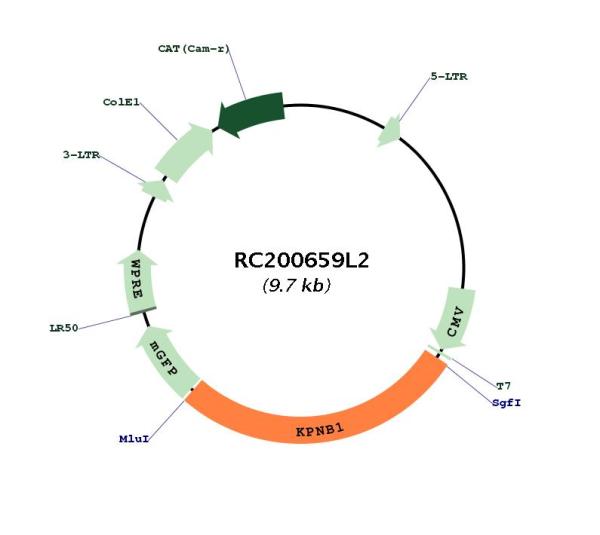KPNB1 (NM_002265) Human Tagged Lenti ORF Clone
CAT#: RC200659L2
- LentiORF®
Lenti ORF clone of Human karyopherin (importin) beta 1 (KPNB1), mGFP tagged
"NM_002265" in other vectors (6)
USD 365.00
Specifications
| Product Data | |
| Type | Human Tagged ORF Clone |
| Tag | mGFP |
| Symbol | KPNB1 |
| Synonyms | IMB1; Impnb; IPO1; IPOB; NTF97 |
| Vector | pLenti-C-mGFP |
| E. coli Selection | Chloramphenicol (34 ug/mL) |
| Mammalian Cell Selection | None |
| Sequence Data |
The ORF insert of this clone is exactly the same as(RC200659).
|
| Restriction Sites |
SgfI-MluI
Cloning Scheme for this gene
Plasmid Map

|
| ACCN | NM_002265 |
| ORF Size | 2628 bp |
| OTI Disclaimer | Due to the inherent nature of this plasmid, standard methods to replicate additional amounts of DNA in E. coli are highly likely to result in mutations and/or rearrangements. Therefore, OriGene does not guarantee the capability to replicate this plasmid DNA. Additional amounts of DNA can be purchased from OriGene with batch-specific, full-sequence verification at a reduced cost. Please contact our customer care team at custsupport@origene.com or by calling 301.340.3188 option 3 for pricing and delivery. The molecular sequence of this clone aligns with the gene accession number as a point of reference only. However, individual transcript sequences of the same gene can differ through naturally occurring variations (e.g. polymorphisms), each with its own valid existence. This clone is substantially in agreement with the reference, but a complete review of all prevailing variants is recommended prior to use. More info |
| OTI Annotation | This clone was engineered to express the complete ORF with an expression tag. Expression varies depending on the nature of the gene. |
| Product Components | The ORF clone is ion-exchange column purified and shipped in a 2D barcoded Matrix tube containing 10ug of transfection-ready, dried plasmid DNA (reconstitute with 100 ul of water). |
| Reconstitution | 1. Centrifuge at 5,000xg for 5min. 2. Carefully open the tube and add 100ul of sterile water to dissolve the DNA. 3. Close the tube and incubate for 10 minutes at room temperature. 4. Briefly vortex the tube and then do a quick spin (less than 5000xg) to concentrate the liquid at the bottom. 5. Store the suspended plasmid at -20°C. The DNA is stable for at least one year from date of shipping when stored at -20°C. |
| Reference Data | |
| RefSeq | NM_002265.4 |
| RefSeq Size | 4205 bp |
| RefSeq ORF | 2631 bp |
| Locus ID | 3837 |
| UniProt ID | Q14974 |
| Cytogenetics | 17q21.32 |
| Domains | Armadillo_seg, IBN_NT |
| Protein Families | Druggable Genome, Stem cell - Pluripotency |
| MW | 97 kDa |
| Gene Summary | Nucleocytoplasmic transport, a signal- and energy-dependent process, takes place through nuclear pore complexes embedded in the nuclear envelope. The import of proteins containing a nuclear localization signal (NLS) requires the NLS import receptor, a heterodimer of importin alpha and beta subunits also known as karyopherins. Importin alpha binds the NLS-containing cargo in the cytoplasm and importin beta docks the complex at the cytoplasmic side of the nuclear pore complex. In the presence of nucleoside triphosphates and the small GTP binding protein Ran, the complex moves into the nuclear pore complex and the importin subunits dissociate. Importin alpha enters the nucleoplasm with its passenger protein and importin beta remains at the pore. Interactions between importin beta and the FG repeats of nucleoporins are essential in translocation through the pore complex. The protein encoded by this gene is a member of the importin beta family. Two transcript variants encoding different isoforms have been found for this gene. [provided by RefSeq, Feb 2013] |
Documents
| Product Manuals |
| FAQs |
| SDS |
Resources
Other Versions
| SKU | Description | Size | Price |
|---|---|---|---|
| RC200659 | KPNB1 (Myc-DDK-tagged)-Human karyopherin (importin) beta 1 (KPNB1) |
USD 1,203.00 |
|
| RC200659L1 | Lenti ORF clone of Human karyopherin (importin) beta 1 (KPNB1), Myc-DDK-tagged |
USD 1,503.00 |
|
| RC200659L3 | Lenti ORF clone of Human karyopherin (importin) beta 1 (KPNB1), Myc-DDK-tagged |
USD 1,503.00 |
|
| RC200659L4 | Lenti ORF clone of Human karyopherin (importin) beta 1 (KPNB1), mGFP tagged |
USD 1,503.00 |
|
| RG200659 | KPNB1 (tGFP-tagged) - Human karyopherin (importin) beta 1 (KPNB1) |
USD 1,403.00 |
|
| SC118719 | KPNB1 (untagged)-Human karyopherin (importin) beta 1 (KPNB1) |
USD 1,204.00 |
{0} Product Review(s)
Be the first one to submit a review






























































































































































































































































 Germany
Germany
 Japan
Japan
 United Kingdom
United Kingdom
 China
China

